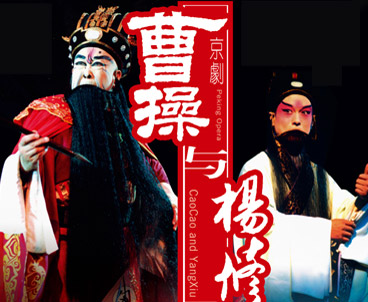Historical Peking Opera: Cao Cao and Yang Xiu
 0 Comment(s)
0 Comment(s) Print
Print E-mail
China.org.cn, January 4, 2009
E-mail
China.org.cn, January 4, 2009
Presenter: Shanghai Peking Opera Troupe
Cast: Shang Changrong, He Shu, Xia Huihua, Guo Ruiyue, Xiao Runnian
Venue: Theatre Hall, The National Center for the Performing Arts
Dates: January 12 - 13, 2009 19:30
Price: VIP/400/300/200/120/80 RMB
Transportation: Subway Line 1, take off at Tian'anmen West station.

Programme Introduction
The newly rewritten historic Peking opera Cao Cao and Yang Xiu was first presented in 1988 and reputed as a "modernized Chinese Opera milestone" right after its debut. The collision between two characters and two souls has had an extremely stirring significance up to now.
After the War of Red Cliff, Cao Cao, the Prime Minister of Han Dynasty, was not dispirited after being defeated and tried to stage a comeback to unite the three kingdoms. He sought after men of worth and ability eagerly and was hunger for talent. Celebrity Yang Xiu had made brilliant political accomplishments and was appreciated and put in an important position by Cao Cao. However, their cooperation turned a tragedy. Both Cao Cao and Yang Xiu were outstanding men of the time, but their lofty and despicable characters prevented them from working together. Hence a series of complicated dramatic dispute unfolded.
The plot of the Peking opera is soul-stirring and mutual contention, coveting and consumption between Cao Cao and Yang Xiu run through the whole opera to reflect the deep meaning of the work through profound conflicts of characters. This is an unavoidable tragedy caused by the irreconcilable confrontation between feudal powerful characters and literary intellectual characters in the Chinese history: power and intelligence differed from each other and politicians and intellectuals were mutually separated. The opera's description surpasses the historical record, shows the tragedy inherent in the feudal society and is thought-provoking. It does not simply use the past to allude to the present but tries to analyze the characters' souls profoundly and carefully and explore the inherent tragic factors so as to harmonize history and the present.
Without Shang Changrong, there would be no Cao Cao and Yang Xiu; and without Cao Cao and Yang Xiu, there would probably be no today's Shang Changrong. The two complemented each other and thus created the unprecedented image of Cao Cao on the opera stage.
The "new Cao Cao" played by Shang Changrong is neither the Cao Cao in the Romance of Three Kingdoms nor the "elevated Cao Cao" depicted by Guo Moruo in Cai Wenji, still less the "white-faced Cao Cao" portrayed by Jin Shaoshan, Hou Xirui, Qiu Shengrong, Yuan Shihai and other master actors of Hua Lian figures, but is a "great historic figure deeply restricted and confined by petty and low humanity": he was ambitious, but could not conceal his inner lowliness; he sought for talented people, but could not help suspecting them. The "new Cao Cao" is a complicated but real art image and he is both "historic and modern."
Shanghai Peking Opera Troupe
As one of the major Peking Opera troupes proclaimed by the Ministry of Culture, Shanghai Peking Opera Troupe (SPOT) was established in 1955 as a result of the merger between Peking Opera Troupe of Eastern China Experimental Theater and Shanghai People's Peking Opera Troupe. Its first director was Master Zhou Xinfang, an outstanding Peking opera artist.
SPOT has her own cultural ambience of Shanghai, unique art style and a glorious history. Some of the initiators of the schools of Peking opera and Kunqu opera such as Masters Zhou Xinfang, Gai Jiaotian and Yu Zhenfei and other outstanding Peking opera artists including Yan Huizhu and Li Yuru laid the solid foundation for SPOT's art development. Other new plays of historical Peking opera, such as Cao Cao and Yang Xiu, Great Events in the Early Tang Dynasty and Yu Chenglong, an Honest and Upright Official, are also famous and popular.
Go to Forum >>0 Comment(s)